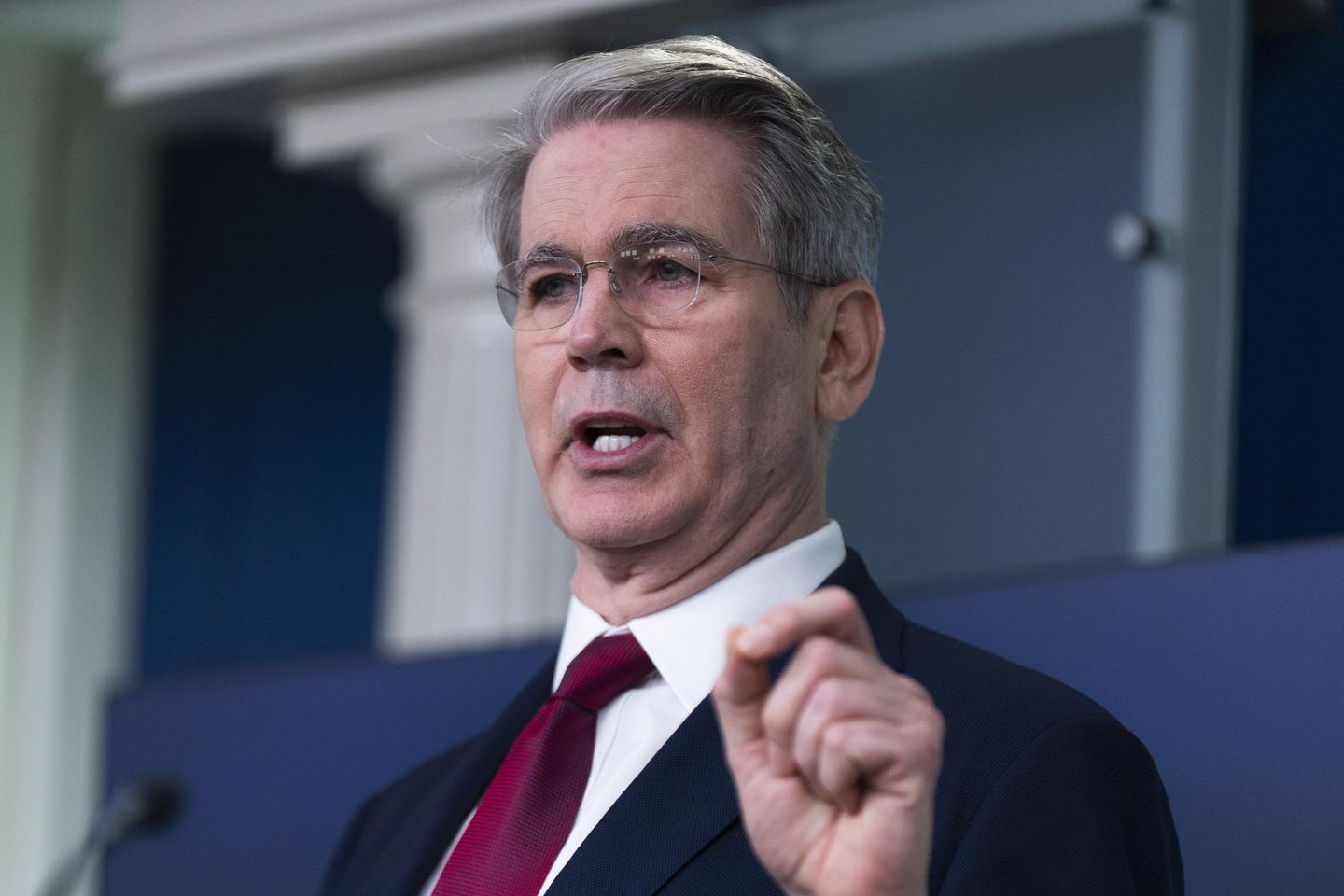
Treasury Secretary Scott Bessent told investors Monday that President Trump’s economic agenda is “more than the sum of its parts,” pointing to deregulation and tax cuts as companions to the White House tariff plan that is making Wall Street anxious.
Mr. Bessent, speaking at the Milken Institute, said Americans will “harvest” the benefits of the intertwined policies.
“The primary components of the Trump economic agenda – trade, tax cuts, and deregulation – are not standalone policies,” Mr. Bessent said. “They are interlocking parts of an engine designed to drive long-term investment in the American economy.”
Mr. Bessent addressed the institute — a think tank that focuses on global challenges in health, finance and other matters — as investors look for progress on trade.
The U.S. and China are locked in a trade war featuring sky-high tariffs that are likely unsustainable for either side. Also, the White House has yet to announce any trade deals with countries hoping to negotiate down Mr. Trump’s “Liberation Day” tariffs, which were put on pause for 90 days.
Wall Street took a downturn on Monday as investors await progress. The Dow Jones Industrial Average slid nearly 100 points, or 0.2%, and the S&P 500 and Nasdaq closed down 0.6% and 0.7%.
The tariff plan has sparked fears of empty shelves, higher prices and slower economic growth. But Mr. Bessent said they are a critical component of building an economic foundation in America.
“Tariffs are engineered to encourage companies like yours to invest directly in the United States. Hire your workers here. Build your factories here. Make your products here,” he said. “You’ll be glad you did – not only because we have the most productive workforce in the world, but because we will soon have the most favorable tax and regulatory environment as well.”
Mr. Trump is flexing unilateral powers to impose sweeping tariffs, including a blanket 10% levy on all imports.
Other aspects of his agenda rely on Congress. GOP majorities are working on a “big, beautiful bill,” as Mr. Trump calls it, to implement the White House’s tax and spending plans.
Republicans are working through a series of sticking points, including whether the bill will make deep cuts to Medicaid coverage for the poor.
Looking abroad, Mr. Trump is scheduled to meet with Canadian Prime Minister Mark Carney. Trade will likely be front and center, as Canada contends with Mr. Trump’s tariffs on steel, aluminum and cars and a 25% tariff on goods that fall outside the U.S.-Mexico-Canada Agreement.
“I guess he wants to make a deal. Everybody does,” Mr. Trump said of Mr. Carney’s agenda.
Mr. Trump said China also wants to make a deal to bring down sky-high tariffs so its export-heavy economy won’t be “decimated.”
Mr. Bessent, urging patience, compared the emerging economic plan to farmland with high potential.
“We have uprooted government waste and harmful regulations. We have planted the seeds of private investment. And we have fertilized the ground with fresh tax legislation,” Mr. Bessent said. “Next, we harvest. And we want you to harvest with us.”
Mr. Bessent reassured investors one day after Mr. Trump spooked Wall Street again with a fresh threat of tariffs.
This time, the administration took aim at the movie industry, saying too many foreign nations are undercutting American film workers with big incentives.
“I am authorizing the Department of Commerce, and the United States Trade Representative, to immediately begin the process of instituting a 100% Tariff on any and all Movies coming into our Country that are produced in Foreign Lands. WE WANT MOVIES MADE IN AMERICA, AGAIN!” he wrote.
California Gov. Gavin Newsom, a Democrat, has pushed to increase funding for the state’s tax-incentive program, hoping to lure movie-making back to its epicenter.
Mr. Trump on Monday said the governor’s “incompetence” let the industry stray from the U.S.
“He’s just allowed it to be taken away from Hollywood,” Mr. Trump said during an unrelated event in the Oval Office. “Hollywood doesn’t do very much of that business. They have the nice sign, and everything’s good, but they don’t do very much.”
Mr. Trump said he would check with film executives to make sure they liked the tariff idea.
“I’m not looking to hurt the industry. I want to help the industry,” he said.
Mr. Bessent said the administration will make the transition to U.S. production easier for all industries, pointing to efforts to let companies write off 100% of new factory production.
“We have the world’s reserve currency, the deepest and most liquid markets, and the strongest property rights,” the secretary said. “For these reasons, the United States is the premier destination for international capital. And the administration’s goal is to make it even more appealing for investors like you.”












